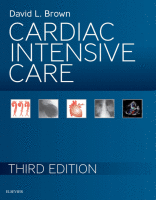Physical Address
304 North Cardinal St.
Dorchester Center, MA 02124

Temporary cardiac pacing delivers electrical cardiac stimulation to treat a cardiac bradyarrhythmia until the underlying problem resolves or a permanent pacing solution is provided. Temporary cardiac pacing is most commonly used for symptomatic bradycardia and is occasionally used to determine…

Peripheral Intravenous Cannulation Patients in the cardiac intensive care unit (CICU) require reliable intravenous access. Dependable peripheral vein cannulation technique is an essential tool to establish intravenous access in critically ill patients. Equipment Equipment for peripheral venous access includes the…

Concomitant administration of several drugs is common in the treatment of cardiovascular diseases. Often, combinations of drugs are necessary and result in improved outcomes. With a large number of medications, however, there is also an increased concern about drug interactions.…

Analgesics, tranquilizers, and sedatives are among the most commonly prescribed medications in the intensive care unit (ICU) and are frequently used for the management of pain, agitation, and delirium. These medications are not benign; as the patient population becomes older…

The management of critically ill patients is often complicated by cardiac arrhythmias. Patients with acute cardiac ischemia, heart failure, respiratory failure, or renal failure are at risk for different arrhythmias, including atrial fibrillation, supraventricular tachycardia, ventricular tachycardia, and ventricular fibrillation.…

Fluid overload has been recognized as a serious complication of cardiac disease. It is associated with an increased risk of respiratory failure, prolonged need for mechanical ventilation, the development of acute kidney injury (AKI), a longer stay in the hospital,…

Inotropic and vasoactive agents often play an important role in the management of hemodynamic instabilty in the intensive care setting. This chapter discusses the relevant pharmacology and clinical indications for the parenteral inotropic, vasodilator, and vasoconstrictor agents most frequently used…

Over the last 3 decades, clinical management and outcomes of patients presenting with acute coronary syndromes (ACSs) have improved dramatically. Better understanding of the role of the platelet in the pathophysiology of the ACS has been the fundamental pillar for…

Antithrombotic therapies are a mainstay of contemporary cardiovascular medicine; it is essential for providers in the cardiac intensive care unit (CICU) to have a thorough understanding of these pharmacologic agents. Patients with acute coronary syndromes (ACSs) and those undergoing percutaneous…

Cardiac arrhythmias, myocardial depression, and vasodilation are the major cardiovascular effects observed in poisonings. A large number of therapeutic and nontherapeutic agents can cause toxicity directed toward the cardiovascular system, whether in the setting of an actual overdose or merely…